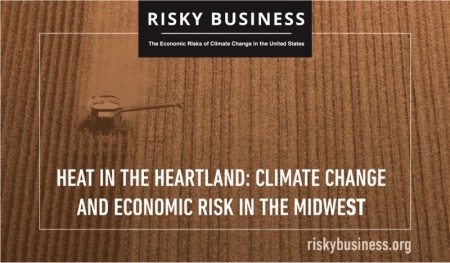 Chicagoans are expected to experience more days over 95°F each year by the end of the century than Texans do now. That is just one of the sobering findings of a report released today on the economic risk of climate change to the Midwestern United States. The report, Heat in the Heartland: Climate Change and Economic Risk in the Midwest, is the latest release from the Risky Business project, a bipartisan initiative headed by Paulson Institute Chairman Hank Paulson, Mike Bloomberg, and Tom Steyer that focuses on quantifying the economic risks of a changing climate. The first report, examining overall climate risk in the US, was released in August.
Chicagoans are expected to experience more days over 95°F each year by the end of the century than Texans do now. That is just one of the sobering findings of a report released today on the economic risk of climate change to the Midwestern United States. The report, Heat in the Heartland: Climate Change and Economic Risk in the Midwest, is the latest release from the Risky Business project, a bipartisan initiative headed by Paulson Institute Chairman Hank Paulson, Mike Bloomberg, and Tom Steyer that focuses on quantifying the economic risks of a changing climate. The first report, examining overall climate risk in the US, was released in August.
At today’s launch event at the Economic Club of Minnesota in Minneapolis, Paulson reiterated the core message: “Our business leaders, our cities, and our investment community need to focus on these risks and act now before it’s too late.”
“As a lifelong Midwesterner, I’m gravely concerned that our ‘business as usual’ path is dangerous, unsustainable and threatens our way of life,” Paulson added. “Climate change poses a tremendous threat to key sectors of the Midwest economy, particularly manufacturing and agriculture.”
These concerns are just as relevant for China, especially as it pursues a large-scale urbanization policy, Paulson added. That’s why the Paulson Institute’s Climate Change and Air Quality (CCAQ) program is working on finding solutions for China’s environmental crisis. Consistent with the Institute’s “think-and-do” approach, the CCAQ program is working on the ground with officials, businesses and academics to help China achieve its carbon emissions goals. An upcoming report will outline ways China can leverage market forces in the region surrounding Beijing to tackle carbon emissions, addressing air pollution at the same time.
At the event, Paulson cited the recent US-China pact on emissions, in which China agreed to cap carbon emissions by 2030, as “important”—“a really bright spot.” If China and the United States focus resources on tackling climate change today, perhaps Beijing and Chicago alike can avoid the sweltering fate predicted in this week’s Risky Business report.


